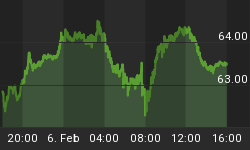Given all that stress that the Federal Reserve's currency debasement program is laying on the global economy, last week's G-20 summit in South Korea should have been the monetary equivalent of a military degradation for the U.S. dollar. The greenback should have been slapped across the face, stripped of its medals, and cashiered from the ranks of respected currencies. Instead the dollar escaped unscathed, retaining its privileged status as the world's reserve.
However, the meeting did have its dark moments for America. The troubles starting even before the summit began with the failure of president Obama to conclude a long-planned trade deal with South Korea. Once the G-20 meetings began in earnest, the United States made scant headway with its main initiative to pressure the Chinese on Yuan revaluation. Just when it looked like the dollar would benefit from strife in Europe, a joint statement by key European leaders signaled that potential problems within the euro-zone may have been averted. In other words, nothing from this meeting should give any confidence that the dollar has a bright future.
Over the past three years, while the Chinese Yuan has appreciated ever so slightly against the U.S. dollar, it has depreciated against almost all other major currencies. As a result, one may have expected wider support for America's calls for appreciation of the Chinese Yuan. But in Seoul this issue was buried amidst rancor and fractious all-night meetings between splintered partners. Most participants were so focused on America's second campaign of quantitative easing, that the question of Yuan appreciation was moved to the back burner.
In an effort to avert competitive devaluations, the U.S. proposed that nations should restrict their current account surpluses and deficits within agreed percentages of economic output. Ironically, this idea had been proposed by the British at Breton Woods in July 1944. But this was at a time when war-ravaged Europe was in huge current account deficit. America was in massive surplus and vetoed the idea. Now that America is in chronic deficit, it is surplus countries such as China, India, Brazil, and Germany that oppose the idea.
While such restrictions would certainly be beneficial for all, given the lack of international enforcement mechanisms, it's hard to envision how, when push comes to shove, sovereign countries would respect the guidelines. Certainly America's power to persuade is greatly diminished.
America has lost much of the enormous political, economic, and financial prestige it enjoyed following World War II. In past G-7 and G-20 meetings, what America suggested usually was adopted. Now that other nations see the United States in trouble with no clear plan, rancor has replaced respect and argument has supplanted compliance.
In economic terms, the world appears leaderless, and China is anxious to fill the vacuum. Although its economy is still but one-third the size of that of the United States, China's power is growing daily. It is clear that it will not bow to American pressure. However, as an ancient and experienced nation, China knows a thing or two about diplomacy. Publicly, at least, China withheld its closely held push to challenge the U.S. dollar's privileged role as the international reserve currency. There can be little doubt that China is carefully choosing its best moment to strike.
In the meantime, the dollar is benefited from continuing trouble in Europe. Based on the growing crisis in Ireland, it now seems clear that sovereign debt problems of many 'euro zone' countries were only papered over temporarily by the ECB and IMF rescue plan of early 2010. Hard working German voters are now voicing revulsion at the prospect of more bailouts. To stem a voter revolt, German Chancellor Merkel has called for private holders of sovereign bonds to share the losses. But there are problems with this approach.
The EU treaty precludes individual states from bailing out others for reasons deemed "unexceptional" (defined as issues within a country's control). In order to bypass this rule, Euro zone governments had persuaded their banks to buy sovereign bonds to camouflage a direct bailout. The deception worked. Investors moved funds out of the U.S. dollar and into the euro, driving it higher. However, Chancellor Merkel's pronouncement reversed this trend, the euro faced a second great crisis and the U.S. dollar experienced temporary strengthening. However, a joint G-20 announcement from the finance ministers of Germany, France, Italy, Spain, and Great Britain effectively diluted Chancellor Merkel's position. This German retreat was enough to stem euro declines.
As far as investors are concerned, the G-20 provided little new information, but confirmed the continuing drift. The international monetary system is still based upon the gravely flawed U.S. dollar. The Yuan will not be allowed to rise in the near term, the euro faces great political challenges, and the U.S. dollar seems continually to be devalued. Meantime, precious metals, key commodities, and hard currencies should continue to benefit.
For in-depth analysis of this and other investment topics, subscribe to The Global Investor, Peter Schiff's free newsletter. Click here for your free subscription.
Click here to download Peter's latest Special Report: My Five Favorite Gold & Silver Mining Stocks.
Be sure to pick up a copy of Peter Schiff's just-released economic fable, How an Economy Grows and Why It Crashes. Click here to learn more and order.















